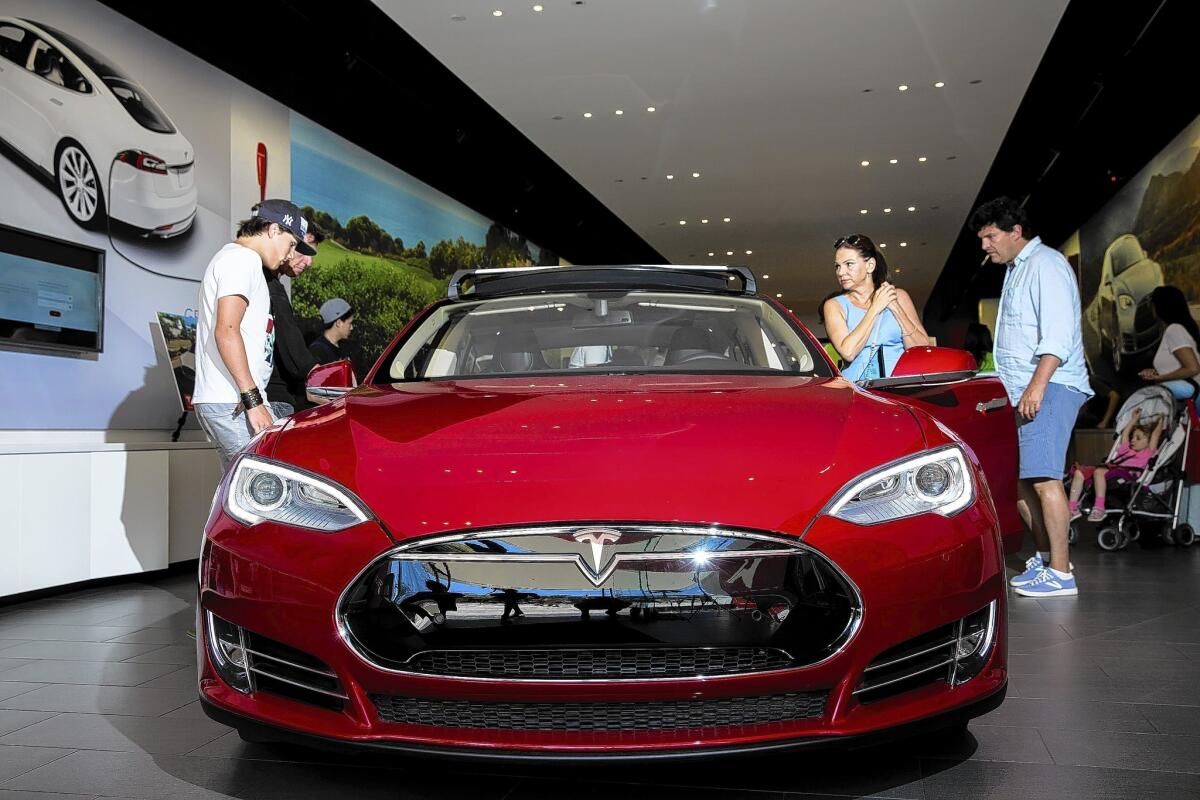Clean autos get boost in 3 bills

- Share via
A bill that would phase out rebates for the wealthy who buy plug-in hybrid and electric vehicles passed the Assembly and could join two related bills Thursday on their way to Gov. Jerry Brown’s desk.
One of the other bills would increase the number of carpool-lane permits for solo drivers using plug-in hybrid cars. The third bill would prohibit landlords from stopping renters from installing electric car chargers as long as the tenant pays for installation.
Brown has until the end of September to sign the bills.
All are meant to advance the California Air Resources Board’s goal of getting 1.5 million zero-emission vehicles onto the state’s roads by 2025 — more than 15 times the number now. The board also has a target that 15% of all new vehicle sales within the state will be zero-emission vehicles by 2025.
The key measure, SB 1275 by Sen. Kevin de León (D-Los Angeles), goes back to the Senate to approve changes the Assembly made before going to Brown. De León expects quick consent Thursday.
The bill would instruct California’s Air Resources Board to determine a household income level at which the clean-vehicle rebate — $2,500 for an electric car — would be phased out.
More than 72,000 Californians already have received electric car rebates amounting to more than $151 million, according to the Center for Sustainable Energy, which administers the program for the Air Resources Board.
Nearly four-fifths of the state’s clean-vehicle rebates have gone to households earning $100,000 or more annually, according to a state survey of buyers. Nearly half of those getting rebates for Tesla’s premium electric sedan earned at least $300,000.
About 14,500 others have bought eligible cars and filed for the rebates but have yet to be paid by the state.
The De León bill would divert future funds to less-affluent buyers and would set aside other money to subsidize the purchase of zero-emission vehicles by low-income consumers.
The bill has the support of environmental groups.
“This bill will make electric cars and car-sharing opportunities affordable to working families,” said Vien Truong, environmental equity director for the Greenlining Institute. “It will also let low-income families cash in their clunkers and use that voucher with clean-car rebates or for car-sharing programs and public transportation.”
Plug In America, an electric-vehicle advocacy organization, remained opposed.
“The problem is that the bill is vague,” said Mike Kane, Plug In America’s treasurer. “Depending on the specific income cap chosen, the bill’s impact on the acceleration of EV adoption could be devastating.”
De León has insisted that it is essential for the state’s future that all Californians have access to electric car rebate programs.
“Tackling climate change and dirty air requires policies that reach all of California’s communities,” De León said. “Clean-air rebate programs must be accessible to every California community, regardless of wealth.”
But Kane contested De León’s assertion that the current rebate format doesn’t do enough to relieve lower-income communities of air pollution from automobile traffic.
“In fact, clean-air benefits occur in areas close to freeways and where oil is refined and distributed — communities that are disproportionately low income that in fact would benefit the most from cleaner air,” Kane said. “The argument that lower-income communities aren’t benefiting from clean-air rebates is fallacious.”
Nissan and Tesla, the two companies that sell the most electric cars in California, have not taken a position on the legislation. Nor has the Air Resources Board.
De León’s bill also would provide other incentives for low-income earners to migrate to electric cars and plug-in hybrids.
A family of four with an annual household income of $53,000 could bundle state incentives toward the purchase of a cleaner vehicle. The family could get $1,500 for retiring a high-polluting vehicle, along with the existing $2,500 rebate for buying an electric car.
Low-income families also could qualify for an additional $3,000 incentive for a clean-air vehicle. The incentive could be even larger for a buyer who lives in a neighborhood with poor air quality.
Alternately, residents could retire an older car, without buying a new one, and get $3,000 to pay for public transit passes or a car-sharing program membership.
The Assembly is also working to expand another perk for people who buy so-called transitional zero-emission vehicles. Those include the Chevrolet Volt, Toyota Prius plug-in, Honda Accord plug-in, Ford Fusion Energi, Ford C-Max Energi, Cadillac ELR and BMW i3 with the gas-engine range extender.
AB 2013 by Assemblyman Al Muratsuchi (D-Torrance) would increase the cap on the number of green clean-air vehicle stickers to 70,000 from 55,000. The Air Resources Board has already issued more than 52,000.
This does not affect the white stickers, which are for electric cars, fuel-cell vehicles and compressed natural gas autos. There is no cap on those permits, but they expire Jan. 1, 2019.
Muratsuchi’s bill passed its final vote in the Assembly on Monday and is waiting for Brown’s signature.
The auto industry is urging Brown to sign the legislation.
“We know this consumer incentive program works, which is why we are urging the governor to continue his commitment to reducing emissions and increase the program’s scope. The more stickers allocated, the more zero-emissions vehicles are on California roadways,” said Curt Augustine, director of policy and government affairs for the Auto Alliance.
Another bill by Muratsuchi that passed this week, AB 2565, says that property owners “cannot unreasonably” deny a tenant the ability to install a charging station if the renter pays the expense.
“The bottom line is that if a tenant wants to install an EV charger and is willing to pay for it, they should be allowed to do so,” Muratsuchi said.
Twitter: @latimesjerry







